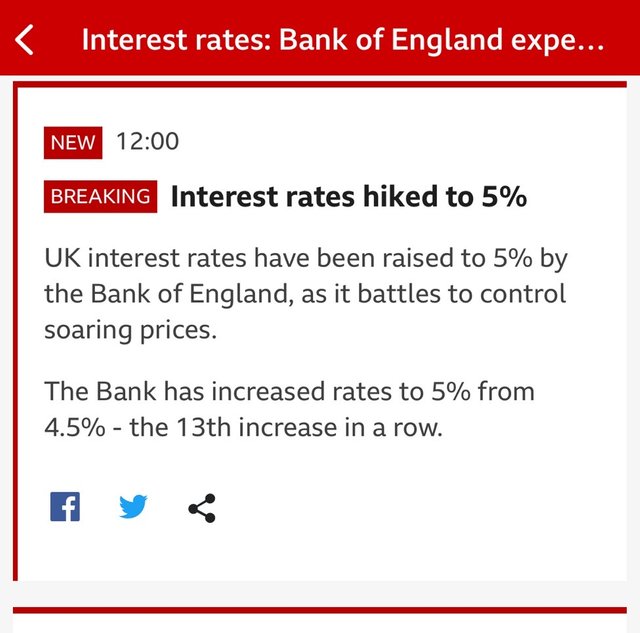UK interest rates have been raised to 5% bythe Bank of England, as it battles to controlsoaring prices.
The Bank has increased rates to 5% from4.5% - the 13th increase in a row.

Interest rates are the cost of borrowing money, and they are a key tool used by the Bank of England (and other central banks) to manage the economy. If interest rates in the UK have been increased to 5%, it could have a variety of effects on the economy, businesses, and individuals. Here are some potential outcomes:
Cost of Borrowing
The most direct impact of a rise in interest rates is that borrowing money becomes more expensive. This can affect individuals and businesses who have loans or mortgages. For individuals, this could mean higher mortgage payments if they have a variable rate mortgage. For businesses, the cost of financing operations or expansions may increase, which could lead to reduced investment.
Savings
Higher interest rates can encourage people to save more, as the return on savings is higher. This could decrease consumer spending in the short term, as people might hold off on making large purchases to save money instead.
Inflation
Higher interest rates can help to control inflation by slowing down economic activity. If the cost of borrowing is higher, people and businesses may cut back on spending and borrowing, which can reduce demand and slow inflation.
Currency Value
Higher interest rates can make a country's currency more attractive to foreign investors, which can increase the value of the currency. This could make imports cheaper, but exports more expensive, which could impact trade balances.
Debt Servicing
For the government, higher interest rates increase the cost of servicing public debt. This might lead to increased government spending on interest payments, which could affect public finances.
Consumer Confidence
Depending on how the interest rate hike is perceived, it could either decrease or increase consumer confidence. If consumers see the hike as a sign of a strong economy, it might boost confidence. However, if they perceive it as a measure to curb inflation or economic overheating, it could decrease confidence, leading to reduced spending.
Housing Market
Higher interest rates can slow down the housing market as mortgages become more expensive. This could lead to lower house prices, or at least a slowdown in the rate of house price growth.

Steem to the Moon🚀!
- You can swap the STEEM/SBD to USDT (TRC-20) via Steem2USDT!
- Register a free STEEM account at SteemYY!
good day to you, you great a nice job. could you help me
Downvoting a post can decrease pending rewards and make it less visible. Common reasons:
Submit
!thumbsup
Downvoting a post can decrease pending rewards and make it less visible. Common reasons:
Submit
Hello @justyy! You are Stellar!
command: !thumbup is powered by witness @justyy and his contributions are: https://steemyy.com
More commands are coming!
Downvoting a post can decrease pending rewards and make it less visible. Common reasons:
Submit
!ask What could happen in 100 years?
Downvoting a post can decrease pending rewards and make it less visible. Common reasons:
Submit
In 100 years, technological advancements could be so advanced that humans may be able to colonize other planets. Renewable energy sources will likely be the primary choice for most countries, and a large portion of the world’s population will likely be living in cities. Human-computer interaction may have become so common that artificial intelligence and robotics will likely play a major role in everyday life. Medical advances could also lead to longer lifespans for humans, and global healthcare may become more equitable. Climate change could cause drastic shifts in weather patterns and sea levels, leading to more extreme weather events and coastal flooding.
command: !ask is powered by witness @justyy and his contributions are: https://steemyy.com
More commands are coming!. !ask is currently based on ChatGPT-3.5
Downvoting a post can decrease pending rewards and make it less visible. Common reasons:
Submit
I love this, you did a great job at explaining the pros and cons of elevated interest rates. Another thing that higher interest rates help with, it gives more flexibility to central banks to manage recessions…when there is sluggish economic activity, and low inflation (or deflation), Central banks can drop rates, making borrowing less expensive, so people spend more, which fuels economic activity, which softens the negative impact of a recession. When rates were zero, it was much harder to manage recessions without printing more money, buying financial assets, and inflating central bank balance sheets.
Downvoting a post can decrease pending rewards and make it less visible. Common reasons:
Submit